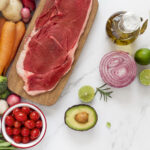
This is a sensitive month of pregnancy wherein lots of changes take place in the body of the mother, and the initial development of the fetus begins. Proper nutrition is necessary in this stage for the health of the mother and the development of the growing fetus. It is during this month that the kind of food mothers eat must be really consciousness because complications may arise. Some foods and drinks could be harmful to the health of the fetus and may interfere in development, if not taken properly. Identifying such foods and avoiding them is necessary right from the very first month.
What Foods Should Be Avoided?
- High-Mercury Fish
- Why Avoid?
High-mercury fish can harm the fetal nervous system. Mercury is a poisonous substance present in large fish, such as shark, swordfish, king mackerel, and tuna. Ingestion of such substances may affect the development of the fetus due to impaired brain and nervous system development. Research has proved that exposure to mercury results in mental and physical defects.
- Healthy Alternatives:
Those including low-mercury fish, such as salmon, trout, and sardines, which are safe and full of omega-3 fatty acids that boost fetal brain development.
- Unpasteurized Dairy Products
- Why to avoid?
Unpasteurized dairy products can contain bacteria such as Listeria. Listeria can cause listeriosis, an infection that can lead to serious problems during pregnancy, such as miscarriage, premature birth, and infections in the newborn. For this reason, it is dangerous to consume dairy products made from raw milk.
- Healthy Alternatives:
Pasteurized dairy products, such as pasteurized milk, yogurt, and hard cheeses like cheddar and Parmesan, which are made from pasteurized milk, are safe and nutritious options.
- Undercooked Meat and Eggs
- Why Avoid?
Steak, undercooked hamburgers, raw and undercooked eggs may contain dangerous bacteria like salmonella and E. coli, which can lead to serious infections in the mother and even have negative effects on the fetus. These infections may cause severe digestive problems, fever, and in some cases, serious problems with fetal development.
- Healthy Alternatives:
Consume meat and eggs that are well cooked; there should be no trace of blood or any raw part that increases the risk of infection.
- Too Much Caffeine
- Why Avoid?
High caffeine intake can increase the risk of miscarriage or low birth weight. Caffeine is a stimulant that easily crosses the placenta to the fetus, but the fetus’s body is not yet able to process it. Studies show that consuming more than 200 mg of caffeine per day may be associated with pregnancy risks. Sources of caffeine include coffee, tea, caffeinated drinks, and chocolate.
- Safe Amount:
Experts recommend no more than 200 mg daily, the amount in one cup of coffee.

What Foods Should Be Limited?
- Fatty and Processed Foods
- Why Limit?
Fatty and processed foods are often high in saturated fat, added sugars, and additives, which can lead to problems during pregnancy, such as excessive weight gain, high blood pressure, and gestational diabetes. Eating too much of these foods can increase body fat and put strain on the mother’s cardiovascular system, as well as pose long-term health risks to the fetus. The fetus needs a healthy, balanced diet during this period, and consuming too much unhealthy fat can lead to developmental problems. These high-risk foods include fast food, processed snacks, cakes, and pastries.
- Healthy Alternatives:
Pregnant mothers should eat healthy sources of fat, such as olive oil, avocados, and nuts, instead of fatty and processed foods. It is also recommended to consume fresh, homemade foods, which allow for more control over the ingredients.
- Sugars and Artificial Sweeteners
- Why Limit?
Added sugars and artificial sweeteners can cause rapid weight gain, gestational diabetes, and heart problems. In the first month of pregnancy, the mother’s body becomes more sensitive to insulin regulation, and excessive sugar consumption can quickly increase blood sugar levels. Also, some artificial sweeteners, such as aspartame and saccharin, may pose health risks to the mother and fetus in large amounts. These high-risk foods include sugary and carbonated drinks, industrial desserts and sweets, and foods and drinks containing artificial sweeteners.
- Healthy Alternatives:
Instead of processed sugars, you can use natural sugars such as honey or fruit juices. Also, consuming fresh fruits as healthy snacks and a source of natural sugars is very beneficial. Pregnant mothers should pay attention to moderation even in consuming these natural sources.
- Salt and Salty Foods

- Why Limit?
High salt intake can lead to high blood pressure and swelling (fluid retention) during pregnancy. High blood pressure is also a risk factor for preeclampsia (pregnancy poisoning), which can have serious complications for both mother and fetus. Processed and prepared foods should be consumed with caution because of their high salt and sodium content. Canned and prepared foods such as canned soups and processed meats such as sausages, salty snacks such as chips and salted nuts are high in salt.
- Healthy Alternative:
Consume fresh foods that do not contain too much sodium, and taste them with herbs like basil or mint instead of salt.
- Spicy and Strongly Seasoned Foods
- Why Limit?
Eating very spicy foods can cause heartburn and digestive problems during pregnancy. The mother’s stomach and digestive tract are more sensitive during this period, and consuming spicy spices can irritate the stomach and cause symptoms such as nausea, acid reflux, and indigestion. These problems can reduce the mother’s quality of life and cause ongoing dissatisfaction and discomfort.
- Healthy Alternatives:
Instead of using very spicy spices, mothers can use milder spices such as ginger, cinnamon, and turmeric, which are both flavorful and have anti-inflammatory properties. These spices help maintain a healthy digestive tract and can be a good alternative to very spicy foods.
Which Eating Habits Are Regarded As Risky?
- Consuming Raw Fruits and Vegetables Without Washing
- Why Should You Avoid or Take Extra Care?
Raw, incompletely cooked fruits and vegetables can contain bacteria, parasites, and germs that are hazardous to the health of both mother and fetus. Toxoplasmosis is one of the most common parasites transmitted through incompletely cooked fruits and vegetables. The parasite is transmitted through contaminated soil on the surface of fruits and vegetables and is especially dangerous for the fetus because it leads to birth defects. Other bacteria, like salmonella and E. coli, are also the cause of food poisoning via undercooked agricultural produce. Included in this category are leafy greens like lettuce and spinach, and fruits that are in direct contact with the soil, such as strawberries.
- Healthy Alternatives:
Thoroughly washing and peeling fruits and vegetables will minimize the chances of contamination. Vegetables can be washed with disinfectant solutions, and one should always wash vegetables under running water before eating. Also, if possible, peel fruits to minimize the risk of contamination.
- Herbal Teas
- Why Should You Avoid or Take Extra Care?
More so, certain herbal teas are considered traditional medicines in other culture settings, yet could be dangerous during pregnancy. Medicinal herbs and teas contain active ingredients that have adverse actions on pregnancy. Some of these herbs may cause uterine contractions leading to premature labor or miscarriage. Other herbs interfere with the body’s hormones or harm the health of the fetus. For example, herbs such as licorice, saffron, and sage may be dangerous in pregnancy.
- Healthy Alternatives:
Some teas are safe to consume during pregnancy and may reduce symptoms such as morning sickness. The safe teas include ginger, peppermint, and chamomile, but must be taken upon doctor consultation nonetheless. Herbal tea is also best consumed in moderation during pregnancy, with a complete void of herbal teas that you don’t know about.
- Organ Meats
- Why Limit?
This is especially true for the intake of animal liver, brain, heart, and kidneys, which are all very rich in vitamin A. While the nutrient is needed in the body, excessive intake may pose a danger to the fetus. Excessive intake of vitamin A, particularly through sources such as liver, can result in birth defects within a fetus. Consumption of certain animal organs also has an associated risk of transmitting parasites and bacteria that can endanger the mother’s health.
- Healthy Alternatives:
Other sources of vitamin A, instead of animal liver and organs, that a pregnant mother may consume include green leafy vegetables, carrots, and pumpkin containing beta-carotene. Beta-carotene naturally gets converted to vitamin A in the body, but there is no risk of toxicity upon its consumption.
- Fermented and Pickled Foods
- Why Limit?
Some fermented or salty foods, like pickles and kimchi, may contain a high level of salt, increasing blood pressure and the risk for complications such as preeclampsia during pregnancy. Also, improper fermentation processes can result in contamination with bacteria and parasites that cause food poisoning. While some fermented food helps digestion, too much intake of them is not advisable during pregnancy.
- Healthy Alternatives:
Expectant mothers can use low-salt varieties of pickles, fermented foods that are industrially prepared, and whose fermentation and hygiene processes are controlled. They can also use fresh, fiber-rich vegetables as alternatives to take care of their digestive health and stay away from the risks associated with too much salt.
Final Thoughts
The potential effects on fetal growth or maternal health make even the most harmless-sounding foods risky in pregnancy. It is with avoidance of harmful food and limitation of processed, sweetened, and salted foods that mothers can avoid complications arising from pregnancy. It is important that each mother should be personally guided by scientific sources and advices given by the doctor or nutritionist in order to make a proper, balanced diet. The mindful choices will pay long-lasting dividends for both mother and child.
References








No comment yet, add your voice below!